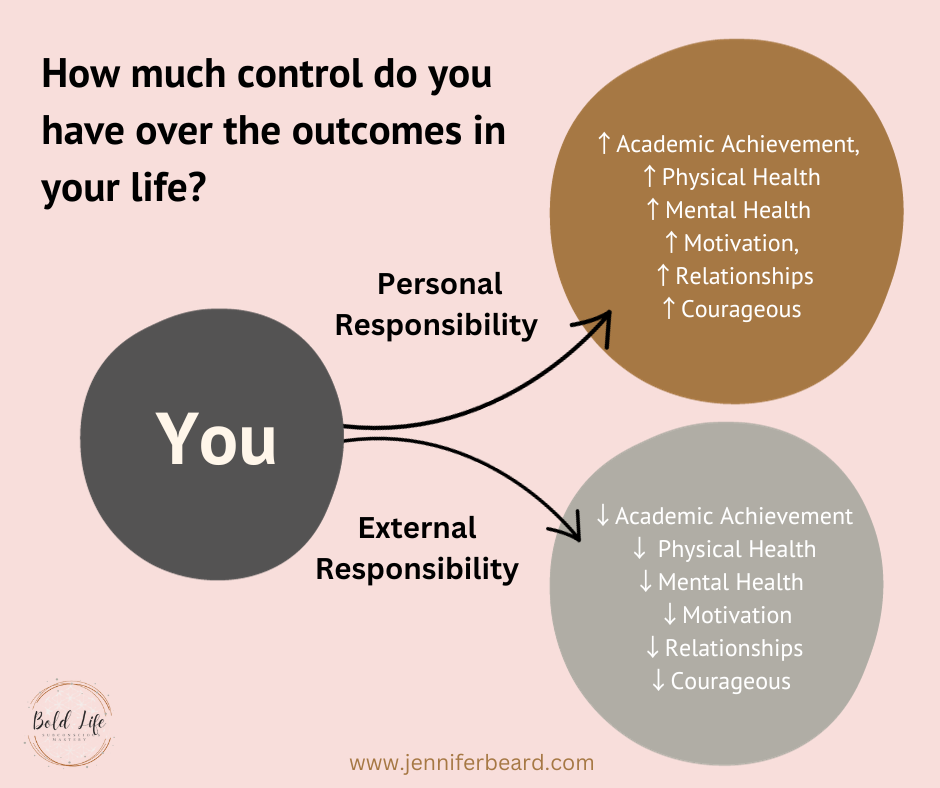Get the Guide
A simple, encouraging guide to help parents confidently transition into homeschooling, build a customized learning rhythm, and create a thriving educational experience at home.
Homeschooling 101 Starter Guide
Family
FAVE LINKS
Topics
Hi, I’m Jennifer — transformation coach, homeschooling mentor, and guide for parents ready to create a life that truly fits. I help you break through fear, align with your values, and confidently design both your child’s education and your own bold, authentic life.










































Imagine standing at a crossroads in life, where every direction was clouded with uncertainty. One path, well-trodden and familiar, leads to a life of external control, where circumstances dictate your happiness and success.
The other, less traveled, winds towards a horizon of self-responsibility and internal locus of control. This is the juncture where our story begins, and it’s a path I’ve walked myself.
Locus of control a psychological term that describes how much control people believe they have over the outcomes in their lives.
It’s an important aspect of personality psychology and was developed by Julian B. Rotter in 1954.
This is a story about choice, about taking control, and it’s a narrative familiar to many.
It’s about understanding that while we can’t control external factors like the weather or other people’s actions, we have the ultimate power over our reactions and perspectives.
The Illusion of External Control
Many of us fall into the trap of believing that our happiness and success are at the mercy of circumstance.
“I can’t control my work environment,” or “I can’t change how others treat me,” are common refrains.
This mindset, while understandable, keeps us stuck in a cycle of reactivity. In this mindset, our well-being is constantly under threat from factors beyond our control.
The truth is, however, we always have a choice.
Even if the only choice is in how we perceive and react to situations.
By shifting our locus of control from external to internal, we become the creators of our destiny.
This doesn’t mean that challenges and adversities cease to exist. Instead, it means we approach them with a different mindset.
I, too, once believed that certain aspects of my life were beyond my control.
It wasn’t until I took responsibility for my beliefs about work and other areas that I experienced a profound shift.
I realized that while I couldn’t control everything, I could control my reactions and the beliefs fueling those reactions.
Taking personal responsibility is akin to lighting a match in a dark room. It illuminates areas of our life where we’ve relinquished control to external circumstances.
It’s about asking, “How am I contributing to this situation?” and “What can I do differently?”
This approach doesn’t just apply to tangible aspects like career or relationships but also to our health and well-being.
The common objection is, “There’s so much I can’t control.” While true, this perspective misses a crucial point: the power of internal control.
We might not be able to control the weather, but we can control how we prepare for it. We can’t control others, but we can control how we respond to them.
And while certain health aspects might be beyond our control, our attitude and actions towards our health are not.
By embracing self-responsibility and an internal locus of control, we empower ourselves.
This empowerment leads to better outcomes in life because we’re no longer passive recipients of fate; we’re active participants in shaping our destiny.
This shift in control brings a sense of fulfillment, purpose, and, most importantly, freedom.
Reflecting on Personal Responsibility
Did you know that lobsters grow by breaking out of their shells? It’s a tough process, but necessary for growth.
Much like lobsters, we often find ourselves constrained by an invisible shell — our beliefs about control.
We can figure out our beliefs by becoming introspective.
- Think about areas in your life where you might be relinquishing control.
- Are there aspects where you’ve adopted a passive stance, blaming external factors for your dissatisfaction or lack of progress?
- Reflect on how shifting your locus of control internally could transform these areas.
This journey towards internal locus of control is not a one-time event but a continuous process of growth and learning.
It involves regularly assessing our beliefs, behaviors, and reactions, and adjusting them to align more closely with our values and aspirations.
Studies on the impact and development have shown the affects of locus of control on life as shown in the illustration.

Shifting your locus of control from external to internal is like finding a hidden control panel in your life.
It’s not about gaining control over the uncontrollable but about mastering how you respond to it. Here’s how you can start:
- Acknowledge Your Power: Realize that while you can’t control everything, you can always control your reaction. This shift is empowering and liberating.
- Embrace Responsibility: It’s tempting to play the blame game. But accepting responsibility for your reactions and choices is the first step to meaningful change.
- Cultivate a Growth Mindset: View challenges as opportunities to learn and grow. This mindset turns obstacles into stepping stones.
- Focus on What You Can Change: Instead of fixating on uncontrollable situations, focus your energy on what you can influence.
- Practice Mindfulness: Stay present and aware. This helps in making conscious choices rather than reacting impulsively.
- Seek Continuous Improvement: Like our lobster friends, don’t be afraid to shed old patterns for growth.
The Road Less Traveled
The path to self-responsibility and internal locus of control may be less traveled, but it’s rich with the rewards of empowerment and personal fulfillment.
As we journey down this road, we discover that the power to change our lives lies within us.
It’s a realization that transforms not just how we react to life but how we live it.
Perhaps for you, this journey is not just about personal growth; it’s about reclaiming the narrative of your life.
It’s about standing at that crossroads and choosing the path that leads inward, to a place of strength, resilience, and profound self-awareness.
It’s a choice that changes everything.
Take care,
Jennifer
p.s. I’ve included a free guide below designed to help you understand where you currently stand on the locus of control spectrum. This download includes more insights and practical tips on how to shift your locus of control. It’s time to break free from your shell and grow into the life you deserve!









































Mastering the Inner Game:
Your Roadmap to
Internal Locus of Control
This guide is designed to empower you to take control of your internal narrative, helping you shift from a mindset where life happens to you, to one where you actively shape your life’s direction. It’s more than a guide; it’s your personal roadmap to transformation.
Disclaimer: Please note that this article is intended to provide general information and inspiration. While it offers valuable insights, it’s essential to remember that it’s not a substitute for professional advice or therapy.

Productivity
Homeschooling
authenticity
intuition
BeLIEF CHANGE
Browse the categories
JenniferBeard.com 2025. All Rights Reserved.
17195 Silver Lake Parkway #136 Fenton, MI 48430 | PRIVACY | TERMS
Hi, I’m Jennifer — transformation coach, homeschooling mentor, and guide for those who are ready to create a life that truly fits. I help you break through fear, align with your values, and confidently design both your child’s education and your own bold, authentic life.
HAPPINESS STARTS
WITH YOU!
Get this practical guide for living a life of joy now!
Start homeschooling confidently
Get the homeschool guide
Check out our private coaching




Comments Off on Embracing the Power Within